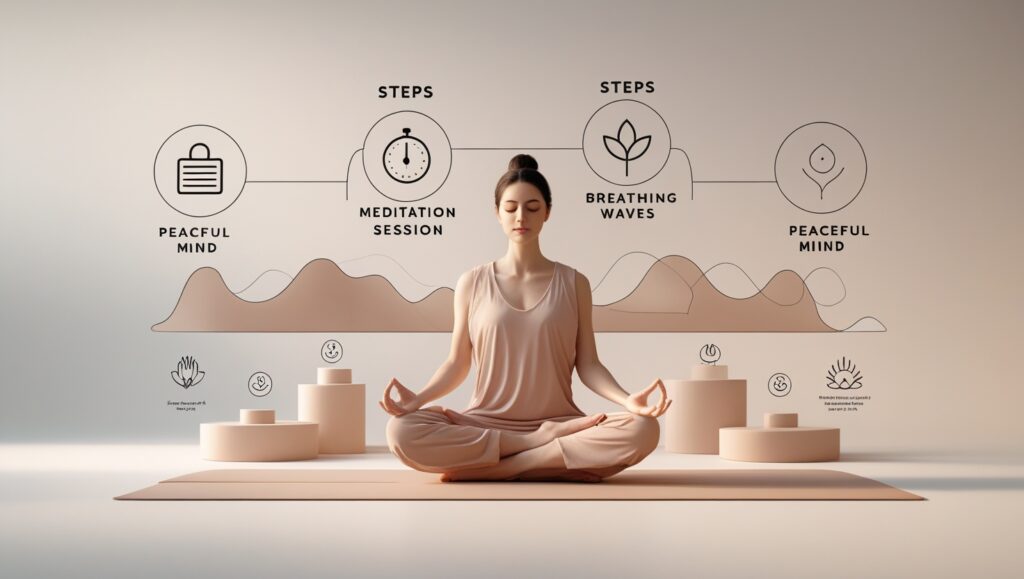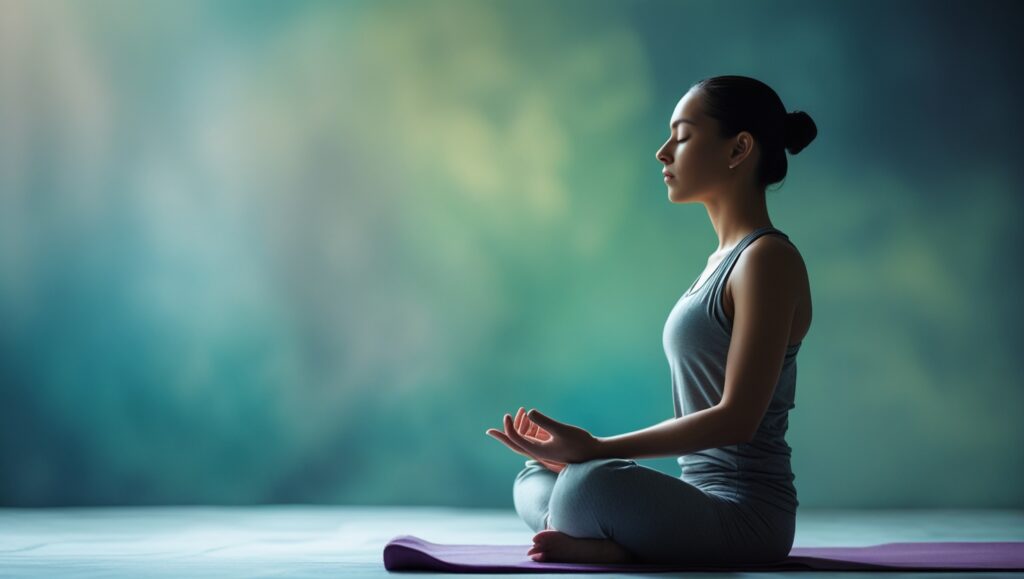Daily Meditation Routine isn’t about following some complicated ritual — it’s about carving out a small pocket of calm in your day. Meditation is simply the practice of pausing, breathing, and giving your mind a chance to slow down. It can sharpen your focus, ease stress, and leave you feeling more grounded.
If you’re new to meditation, it might seem a little strange at first. You might wonder if you’re “doing it right” or if you need special tools. The truth is, you don’t. All you need is a few quiet minutes and the willingness to start. With regular practice, those minutes add up to more mental clarity, better emotional balance, and a deeper sense of self-awareness.
Think of it as training your brain the way you’d train a muscle — little by little, day by day. Over time, you’ll notice it’s easier to stay present, let go of tension, and handle challenges with more patience.
Whether you want to boost concentration, manage anxiety, or simply create a peaceful moment in a busy day, meditation can help. This guide will walk you through building a simple routine that fits your lifestyle — and actually sticks.
Why a Daily Meditation Routine is Essential for Beginners
A daily mindfulness practice is one of the simplest yet most effective ways to improve your mental and physical well-being. Meditation works to quiet the mind, ease tension, and sharpen concentration. For beginners, establishing a consistent routine is key to experiencing its full benefits.
The biggest benefit of meditation is stress relief. Daily practice lowers cortisol levels, helping you feel more relaxed and in control. It also improves emotional balance, making it easier to tackle challenges with a clear mind.
Meditation also increases mental clarity. In a fast-paced world full of distractions, training your brain to focus can help you develop focus and improve decision-making. Even a few minutes a day can improve attention span and concentration.
Physically, meditation promotes relaxation and better sleep. It lowers blood pressure, reduces muscle tension, and supports overall health. The more consistent you are, the greater the benefits.
For beginners, a daily mindfulness practice doesn’t have to be complicated. Take it slow, stay committed, and appreciate the progress.(Moyo-Clinic)
7 Simple Steps to Build Your Daily Meditation Routine
Setting Up Your Meditation Space
Having a dedicated space for meditation makes it easier to stay centered and relaxed. A dedicated, peaceful area signals to your mind that it’s time to slow down and practice mindfulness.
First, choose a quiet environment with minimal distractions. A small meditation nook in your bedroom or living room works well. A clean, organized area fosters a sense of calm and relaxation.
Use soft lighting, candles, or natural elements like plants to enhance the sense of calm. A cushion or chair can help ensure comfort during your session. Adding calming scents, such as essential oils or incense, can deepen relaxation.
Personalize your quiet space with items that bring peace, such as a journal or a small statue. A well-organized space makes meditation easier and more enjoyable.
ou can also pair your practice with an existing morning routine or bedtime ritual for better habit-building.
Choosing the Right Time for Your Daily Meditation
Finding the best time to meditate helps you build consistency. The key is to choose a time that fits your daily schedule and energy level.
Morning meditation is great for a fresh start. It increases focus, sets a positive tone, and helps reduce stress throughout the day. If you prefer a peaceful wind down, evening meditation can promote relaxation and better sleep.
The best time is when you can be consistent. Whether it’s sunrise, midday, or before bed, commit to a routine.Even dedicating a few minutes daily can create noticeable benefits.
Fit your meditation time into your lifestyle and make it a habit. The right time is the one that works.
Selecting a Meditation Technique for Beginners
Choosing the right meditation technique makes it easier to maintain a long-term practice. Beginners should start with simple methods that promote relaxation and focus.
Mindfulness meditation is a great option. The practice centers on being in the moment and watching your thoughts pass without criticism. Guided meditation is another beginner-friendly option, which uses audio or video instructions to guide the practice.
If you prefer physical focus, try breathing exercises to calm the mind. A body scan meditation helps relieve stress by bringing awareness to different parts of the body. Visualization uses mental imagery to create a sense of peace.
Explore different methods until you discover the approach that suits you best. The best meditation is one that you can practice consistently.
Mastering the Basics of Breathing for Meditation
Proper breathing technique is essential for a calm and focused meditation practice. Mindful breathing relaxes the body, improves oxygen flow, and increases concentration.
Begin with a few deep, steady breaths. Breathe in slowly through your nose, allowing your belly to rise, then exhale gently through your mouth. This simple practice can ease tension and help you feel more relaxed.
Another effective technique is breath awareness – focus on each breath and exhale without trying to control it. If your thoughts start to drift, simply notice it and guide your attention back to your breath, without judgment.
Practicing these techniques daily strengthens mindfulness and inner peace. A steady breath creates a steady mind.
Practicing these techniques daily strengthens mindfulness and self-discipline.
A steady breath creates a steady mind.

Building Consistency in Your Daily Meditation Practice
Sticking with meditation can be tough at first, but starting small makes it easier to turn it into a daily habit. Just a few minutes a day, practiced at the same time and place, can help you build consistency and strengthen your routine.
Link your meditation practice to something you already do—like sipping your morning coffee or winding down before bed. This connection makes it easier to turn meditation into a regular part of your day. Gentle reminders, whether through phone alerts or jotting it in your journal, can help you stay consistent.
If you miss a session, don’t stress — just keep going the next day. Progress is more important than perfection. A regular practice builds focus, patience, and resilience. Commit today, and watch your daily meditation routine transform your life!
Overcoming Common Challenges in Meditation
Beginners often struggle with meditation challenges, such as distractions and mind wandering. This is normal! The key is to be patient and keep practicing.
If your mind is racing, gently bring your attention back to your breath. Over time, staying focused will become easier.
Impatience and frustration can also set in. Instead of forcing silence, accept each session as it comes. Short sessions help create consistency without pressure.
External distractions? Find a quiet space or use soft background music to create a calming environment.
Each challenge is part of the journey. Keep going, and meditation will become more natural and rewarding!
Tracking Your Progress and Celebrating Small Wins
Measuring your meditation progress helps you stay motivated. Keeping a mindfulness journal allows you to reflect on your experiences, note improvements, and recognize patterns.
Start by recording the length of your session, how you felt before and after, and any challenges you encountered. Over time, you’ll see an increase in focus, calm, and self-awareness.
Celebrating small successes keeps you motivated. Whether it’s meditating for five days or feeling more relaxed, acknowledge your progress.
Self-reflection helps strengthen the habit. Meditation isn’t about perfection—it’s about consistency. Track your journey, celebrate wins, and enjoy your mindfulness journey.
Conclusion:
Embrace the Power of a Daily Meditation Routine
A daily meditation routine brings lasting peace, focus, and emotional balance. The benefits extend beyond relaxation—it enhances clarity, reduces stress, and strengthens self-awareness.
Your mindfulness journey is unique. ome days, meditation will feel effortless; on others, it might be a challenge. What matters most is showing up each day—consistency is where the real progress happens. Even a few minutes each day can create a profound shift in your mindset and well-being.
Meditation is a lifelong practice, not a destination. Be patient with yourself, acknowledge even the smallest progress, and find joy in the journey.
Start your daily meditation routine today and experience the life-changing benefits of mindfulness!



